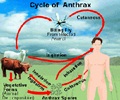When in the dormant stage, a new study has found, anthrax bacteria rely on small viruses to stay alive.
The research team at Rockefeller University have found that the survival of the deadly bacterium Bacillus anthracis is directed and shaped by the DNA of bacteria-infecting viruses."B. anthracis leads a much more complicated life than we had ever known," said Raymond Schuch, a research assistant professor in the lab.
"Small, infecting viruses dramatically alter the survival capabilities of B. anthracis. It is more or less a symbiotic relationship in which the interests of both the bacterium and virus are kept in balance," he added.
Lead researcher Vincent A. Fischetti, head of the Laboratory of Bacterial Pathogenesis and Immunology and colleagues based their study on an innocuous observation made by researcher Louis Pasteur more than 100 years ago.
Pasteur had found that earthworms were associated with anthrax-infected animal carcasses in the ground and hypothesized that the earthworm could play an important role in the life cycle of the deadly pest.
Shuch and Fischetti have confirmed Pasteur's early hunch, and have found that in the gut of the earthworm, B. anthracis infected with a type of virus, known as a bacteriophage, live longer than virus-free bacteria.
Advertisement
According to the researchers, the viruses can alter the lifestyle of B. anthracis in two principal ways.
Advertisement
They also found that depending on the conditions of the environment, the virus's DNA manipulates the bacterium's genome to toggle between spore production and community building.
The relationship appears to result from some sort of evolutionary contract that keeps the interests of bacterium and virus in balance
The study appears in PLoS One.
Source-ANI
TAN










